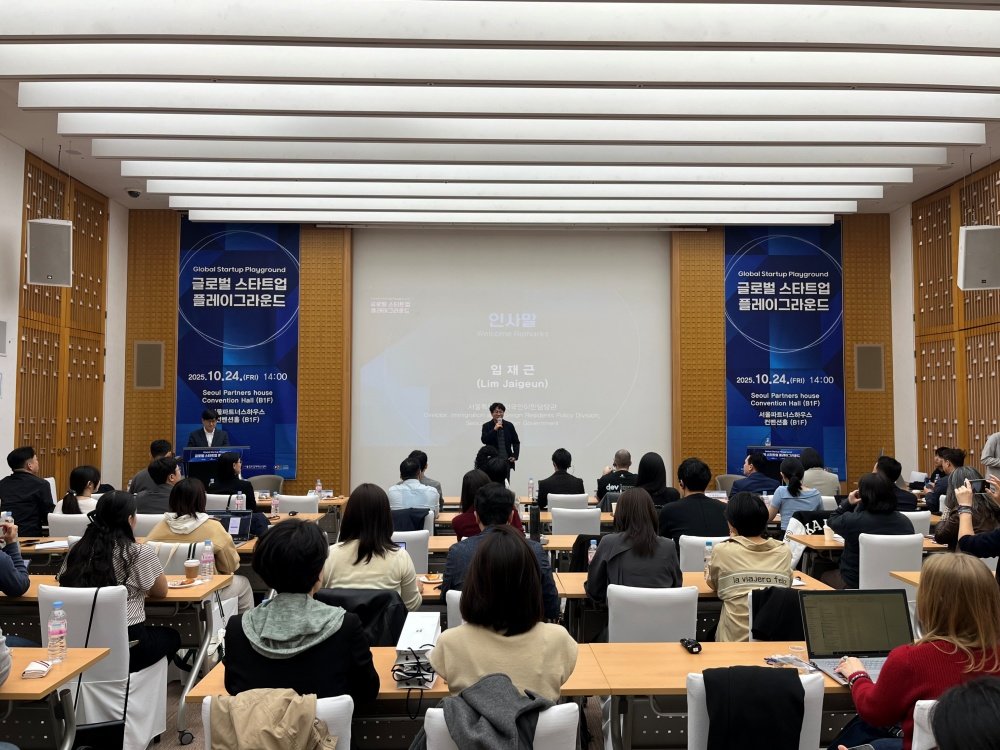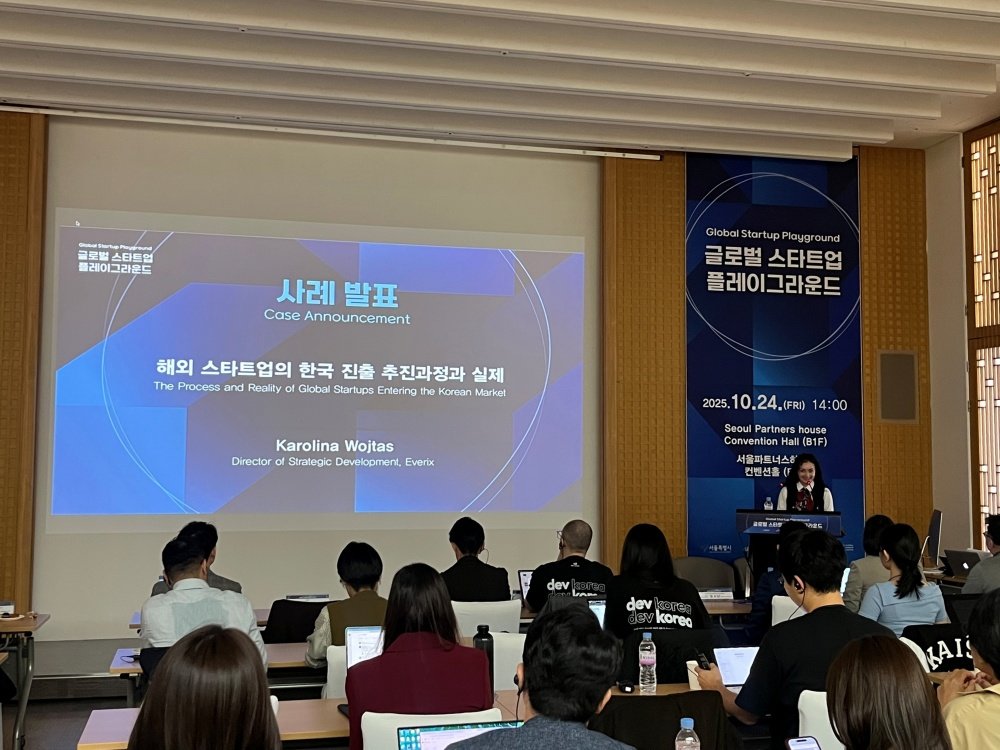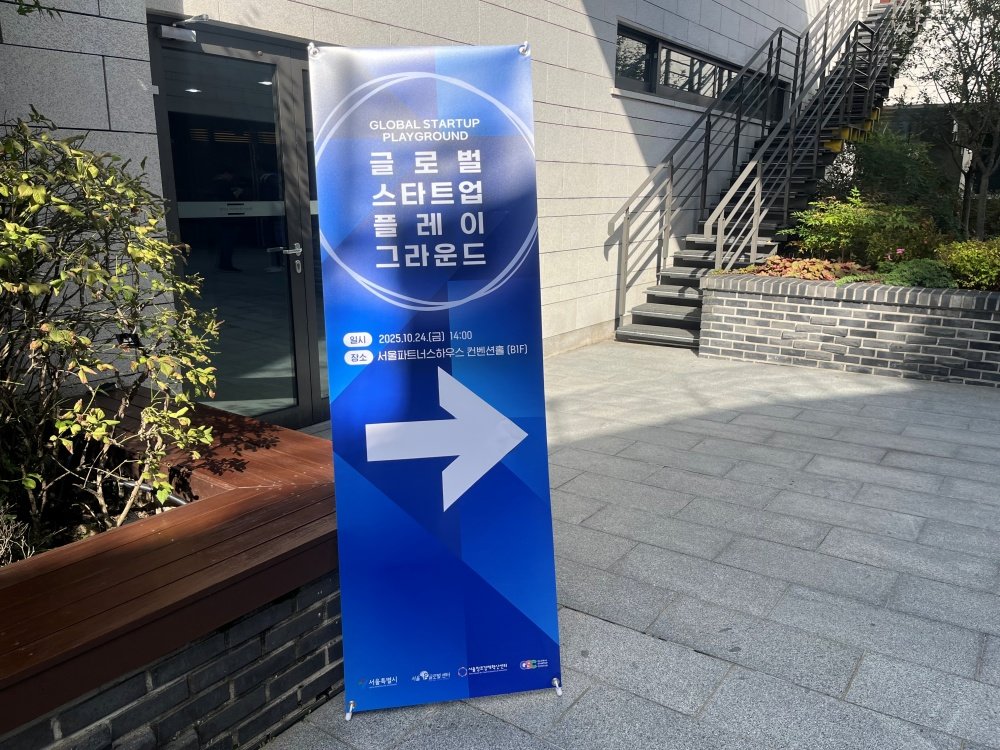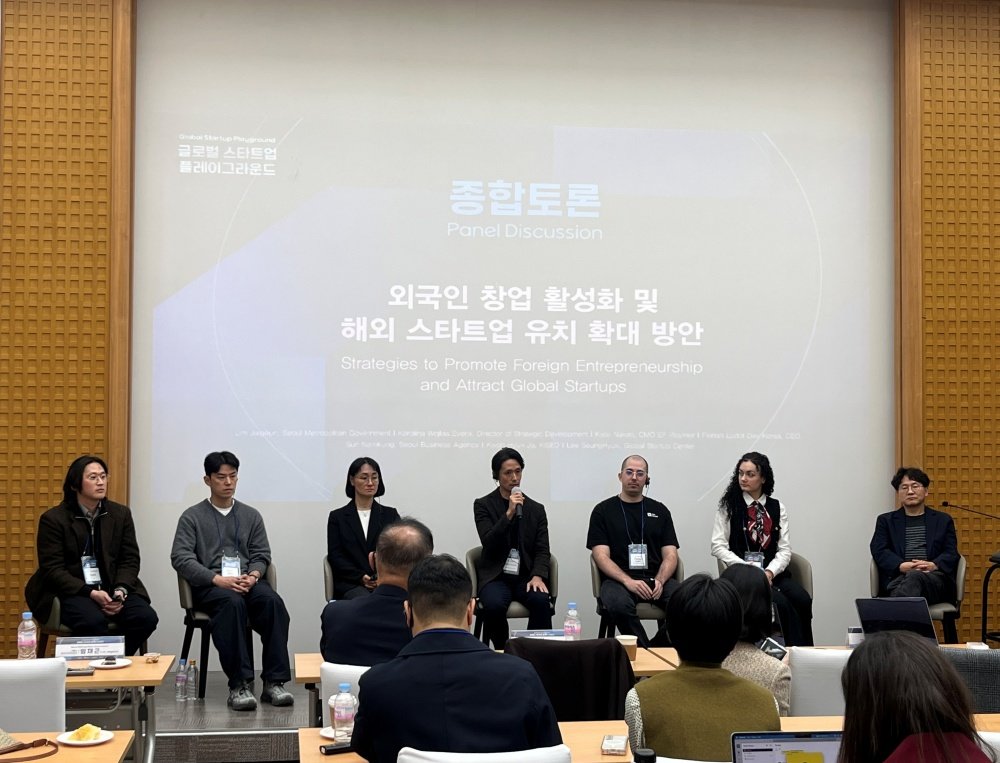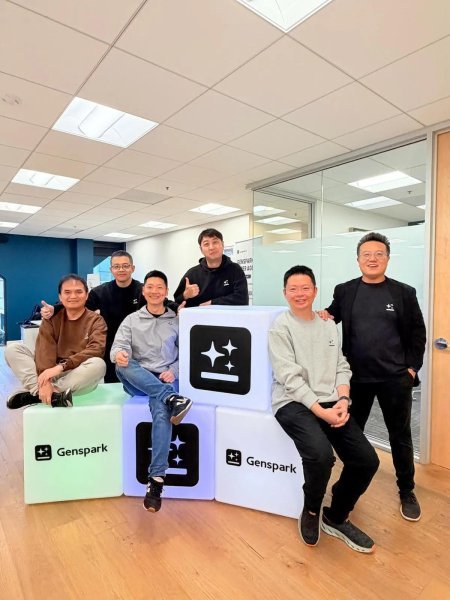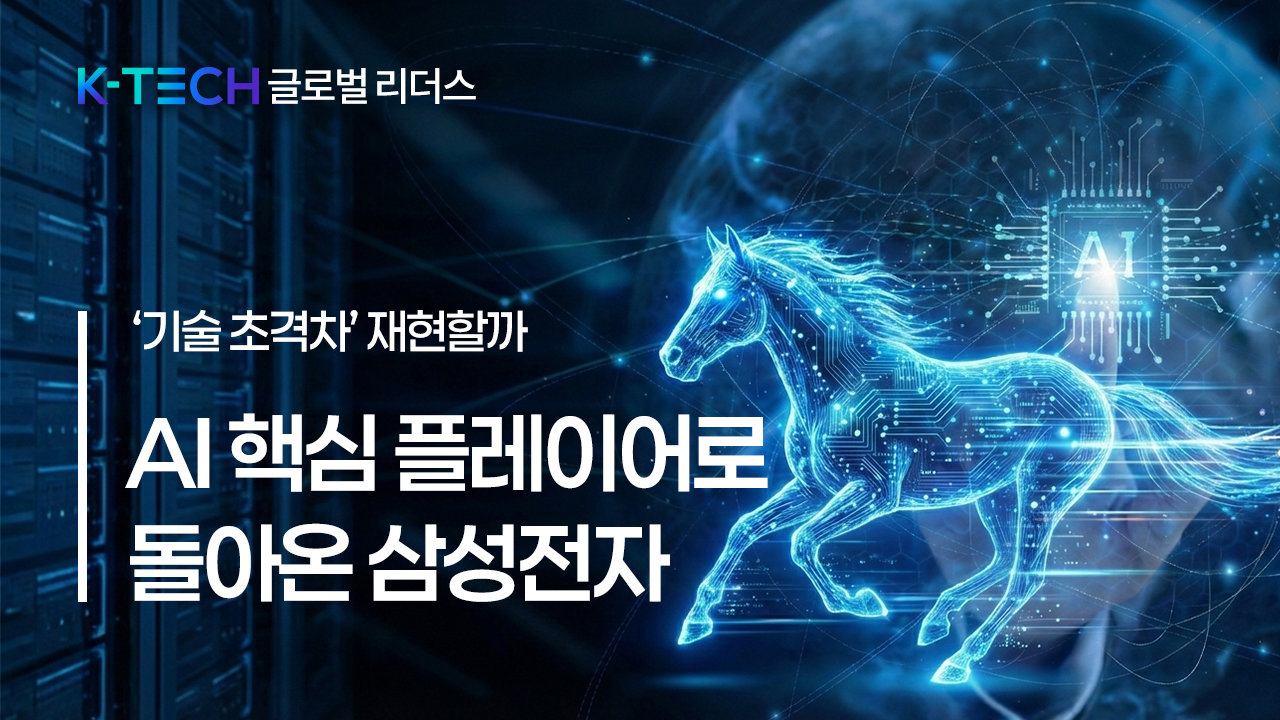
Startup
Global Startup Playground Shares Inbound Activation Strategies
Dong-A Ilbo |
Updated 2025.10.24
The Seoul Metropolitan Government and the Seoul Creative Economy Innovation Center are operating the "Crossover Global Alliance" to support and promote the growth of deep-tech startups through global inbound and outbound expansion. Among these efforts, the "Global Startup Playground" aimed at boosting inbound activities has attracted interest from foreign startups and entrepreneurs.
The second session of the Crossover Global Alliance, the Global Startup Playground, was held on October 24 at the Seoul Partners House in Hannam-dong, Yongsan-gu, Seoul. Over 100 participants, including related organizations, foreign entrepreneurs, international students, and prospective entrepreneurs, attended the event.
The event began with a greeting from Im Jae-geun, Director of Foreign Immigration Affairs at the Seoul Metropolitan Government. He stated, "I have been in charge of startup policy-related work in Seoul for 12 years. Based on that experience, talent is crucial to the success of the startup ecosystem. I hope this event serves as a good opportunity for various exchanges."
The presentation of overseas startup cases was led by the American startup Everix. Everix possesses technology that converts low-cost polymers into nano materials (optical filters). Everix presented on the topic "The Process and Reality of Foreign Startups Entering Korea," stating, "Korea has a leading digital infrastructure such as 5G and high-speed internet, which holds high potential for growth." However, they noted, "There are differences in business culture between the U.S. and Korea. Unlike the U.S., Korea has a strong culture of hierarchy and respect, and often asks personal questions. Understanding different business cultures is important."
Following this, Japanese startup EF Polymer and French startup Dev Korea each gave a five-minute presentation as representatives of overseas startups. EF Polymer emphasized, "Korea's startup ecosystem and support system are more advanced than Japan's. While Japan is often hesitant to collaborate with startups, Korea listens with an open mind to new technologies. The Seoul Creative Economy Innovation Center has been very helpful in our early growth in Korea." Dev Korea stated, "Having conducted business in various countries, Korea's talent is the most outstanding. The startup support ecosystem is also well established. We hope to make Korea an easy country to start a business in Asia and to open up new opportunities. Innovation knows no borders."
Korean institutions such as the Seoul Business Agency (SBA), Seoul Global Center, Seoul Creative Economy Innovation Center, and Korea Startup Promotion Agency explained startup-related policies under the theme "The Present and Future of Seoul's Startup Ecosystem." Namgung Sun, Team Leader at the Seoul Business Agency, captured attention by introducing major fields of startup acceleration in Seoul, including incubation, global expansion, open innovation, discovery and investment in excellent startups, and activation of the startup ecosystem. He added, "There is strong government support for startups, such as venture investment and the TIPS program. Although foreigners are not currently eligible, I believe the day will come when opportunities are also given to overseas companies."
Kwon Bo-geun, Director of the Seoul Global Center, stated, "The Seoul Global Center operates various programs such as attracting global talent and specialized programs for international students. The OASIS program for comprehensive startup immigration support is also active," adding, "The first Seoul Global Center Foreign Startup Competition and Global Entrepreneur Day, introduced this year, were also successfully completed."
Kim Young-jun, Director at the Seoul Creative Economy Innovation Center, explained, "We plan to continuously operate programs for Korean conglomerates and global startups, as well as global conglomerates and Korean startups. The related budget is also expected to expand." He added, "The Seoul Creative Economy Innovation Center will strive to efficiently and effectively activate not only inbound but also outbound businesses."
Kwon Hyuk-jo, Team Leader at the Korea Startup Promotion Agency, who presented on the "Ministry of SMEs and Startups Inbound Startup Policy," explained the visa system, settlement support, and commercialization support funds, stating, "Government support projects generally run from February to the end of the year. It would be good to prepare a business plan around December. Foreign-only programs can be submitted in English, so complex documents are not required. We have recently created a global startup online community that provides various startup information, so please show a lot of interest."
Finally, a comprehensive discussion on "Activation of Foreign Entrepreneurship and Expansion of Overseas Startup Attraction" was conducted. Participants, including Im Jae-geun, Director of Foreign Immigration Affairs at the Seoul Metropolitan Government, Namgung Sun, Team Leader at the Seoul Business Agency, Kwon Hyuk-jo, Team Leader at the Korea Startup Promotion Agency, and Lee Seung-hyuk, CEO of the Global Startup Center, as well as the audience, freely exchanged various opinions. The importance of inbound activation was highlighted through the example of Singapore. Discussions were lively, covering topics from visa system-related discussions to sharing difficulties and improvements in inbound processes.
Additionally, the "Closed Meetup," held as a preliminary event, consisted of a 1:1 closed meetup between overseas startups and domestic conglomerates for about an hour. The purpose was to discover collaboration opportunities between overseas startups and domestic conglomerates to expand the attraction of entrepreneurial talent, making it highly significant.
Meanwhile, the Crossover Global Alliance conducts monthly offline meetings for opinion gathering and discussion. It has been actively operating since the "Kick-off" in September, leading up to the Global Startup Playground in October. In the future, it is expected to expand to outbound activation, open innovation between domestic conglomerates and overseas startups, open innovation between overseas conglomerates and domestic startups, and expansion of joint research and technology cooperation between countries.
IT Donga Reporter Park Gwi-im (luckyim@itdonga.com)
Im Jae-geun, Director of Foreign Immigration Affairs at the Seoul Metropolitan Government, delivers a greeting at the Global Startup Playground, the second session of the Crossover Global Alliance / Source=IT Donga
The second session of the Crossover Global Alliance, the Global Startup Playground, was held on October 24 at the Seoul Partners House in Hannam-dong, Yongsan-gu, Seoul. Over 100 participants, including related organizations, foreign entrepreneurs, international students, and prospective entrepreneurs, attended the event.
The event began with a greeting from Im Jae-geun, Director of Foreign Immigration Affairs at the Seoul Metropolitan Government. He stated, "I have been in charge of startup policy-related work in Seoul for 12 years. Based on that experience, talent is crucial to the success of the startup ecosystem. I hope this event serves as a good opportunity for various exchanges."
The American startup Everix presents a startup case at the Global Startup Playground / Source=IT Donga
The presentation of overseas startup cases was led by the American startup Everix. Everix possesses technology that converts low-cost polymers into nano materials (optical filters). Everix presented on the topic "The Process and Reality of Foreign Startups Entering Korea," stating, "Korea has a leading digital infrastructure such as 5G and high-speed internet, which holds high potential for growth." However, they noted, "There are differences in business culture between the U.S. and Korea. Unlike the U.S., Korea has a strong culture of hierarchy and respect, and often asks personal questions. Understanding different business cultures is important."
Following this, Japanese startup EF Polymer and French startup Dev Korea each gave a five-minute presentation as representatives of overseas startups. EF Polymer emphasized, "Korea's startup ecosystem and support system are more advanced than Japan's. While Japan is often hesitant to collaborate with startups, Korea listens with an open mind to new technologies. The Seoul Creative Economy Innovation Center has been very helpful in our early growth in Korea." Dev Korea stated, "Having conducted business in various countries, Korea's talent is the most outstanding. The startup support ecosystem is also well established. We hope to make Korea an easy country to start a business in Asia and to open up new opportunities. Innovation knows no borders."
The Global Startup Playground was held on October 24 / Source=IT Donga
Korean institutions such as the Seoul Business Agency (SBA), Seoul Global Center, Seoul Creative Economy Innovation Center, and Korea Startup Promotion Agency explained startup-related policies under the theme "The Present and Future of Seoul's Startup Ecosystem." Namgung Sun, Team Leader at the Seoul Business Agency, captured attention by introducing major fields of startup acceleration in Seoul, including incubation, global expansion, open innovation, discovery and investment in excellent startups, and activation of the startup ecosystem. He added, "There is strong government support for startups, such as venture investment and the TIPS program. Although foreigners are not currently eligible, I believe the day will come when opportunities are also given to overseas companies."
Kwon Bo-geun, Director of the Seoul Global Center, stated, "The Seoul Global Center operates various programs such as attracting global talent and specialized programs for international students. The OASIS program for comprehensive startup immigration support is also active," adding, "The first Seoul Global Center Foreign Startup Competition and Global Entrepreneur Day, introduced this year, were also successfully completed."
Kim Young-jun, Director at the Seoul Creative Economy Innovation Center, explained, "We plan to continuously operate programs for Korean conglomerates and global startups, as well as global conglomerates and Korean startups. The related budget is also expected to expand." He added, "The Seoul Creative Economy Innovation Center will strive to efficiently and effectively activate not only inbound but also outbound businesses."
Kwon Hyuk-jo, Team Leader at the Korea Startup Promotion Agency, who presented on the "Ministry of SMEs and Startups Inbound Startup Policy," explained the visa system, settlement support, and commercialization support funds, stating, "Government support projects generally run from February to the end of the year. It would be good to prepare a business plan around December. Foreign-only programs can be submitted in English, so complex documents are not required. We have recently created a global startup online community that provides various startup information, so please show a lot of interest."
A comprehensive discussion on "Activation of Foreign Entrepreneurship and Expansion of Overseas Startup Attraction" was actively conducted / Source=IT Donga
Finally, a comprehensive discussion on "Activation of Foreign Entrepreneurship and Expansion of Overseas Startup Attraction" was conducted. Participants, including Im Jae-geun, Director of Foreign Immigration Affairs at the Seoul Metropolitan Government, Namgung Sun, Team Leader at the Seoul Business Agency, Kwon Hyuk-jo, Team Leader at the Korea Startup Promotion Agency, and Lee Seung-hyuk, CEO of the Global Startup Center, as well as the audience, freely exchanged various opinions. The importance of inbound activation was highlighted through the example of Singapore. Discussions were lively, covering topics from visa system-related discussions to sharing difficulties and improvements in inbound processes.
Additionally, the "Closed Meetup," held as a preliminary event, consisted of a 1:1 closed meetup between overseas startups and domestic conglomerates for about an hour. The purpose was to discover collaboration opportunities between overseas startups and domestic conglomerates to expand the attraction of entrepreneurial talent, making it highly significant.
Meanwhile, the Crossover Global Alliance conducts monthly offline meetings for opinion gathering and discussion. It has been actively operating since the "Kick-off" in September, leading up to the Global Startup Playground in October. In the future, it is expected to expand to outbound activation, open innovation between domestic conglomerates and overseas startups, open innovation between overseas conglomerates and domestic startups, and expansion of joint research and technology cooperation between countries.
IT Donga Reporter Park Gwi-im (luckyim@itdonga.com)
AI-translated with ChatGPT. Provided as is; original Korean text prevails.
ⓒ dongA.com. All rights reserved. Reproduction, redistribution, or use for AI training prohibited.
Popular News







